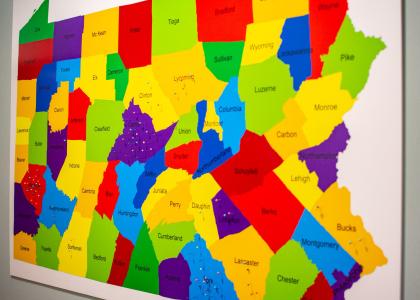Policy

Our Policy Work
The Center for Safe and Healthy Children embraces the basic tenet of science that it should actually improve the lives of those it was designed to impact. One of the greatest barriers to the impact-potential of science is the lack of accessibility—both in terms of policymakers and practice professionals being aware that relevant research exists, and in their access to experts who can translate research into policy-relevant messaging.
A major Core of the NICHD-funded P50 Capstone Center, the Translational Center Child Maltreatment Studies (TCCMS) promotes policy engagement to maximize the impact of science to mobilize system-wide change. This Core uses the empirically tested Research to Policy Collaboration (RPC) model to increase use of research in evidence-informed decision making; specifically to advance legislative priorities regarding sound child-health practice and policies and to increase public investment in prevention and access to treatment.
We work directly with local, state, and federal partners to produce and translate research, and educate and support policymakers in their use of science to inform policy decisions, and to produce factsheets and policy briefs and conduct briefings and hearings for major legislation.
Our use of the RPC model accelerates to use of scientific evidence to impact the lives of the children and families. It bridges the gap between researcher and policymakers to scaffold the research to policy bridge.
Five steps of the Research to Policy Bridge
(1) Initial outreach and listening sessions with key stakeholders to ascertain practice priorities and legislative goals.
(2) Creating a coalition of researchers who have expertise relevant to these goals and who are willing to contribute to translational efforts.
(3) Identifying relevant published research, or conducting short-term research projects, that can provide the most compelling empirical support for legislative goals.
(4) Translating compiled empirical support into educational products—including research articles, fact sheets, policy briefs, awareness events, panel forums, policy "blasts", formal briefings, and invited hearings—that maximize dissemination of these products.
(5) Becoming a “go-to” resource for these key stakeholders by cultivating ongoing collaborative relationships through interpersonal trust, unassailable research methods, dependability, responsiveness, and mutual goals.

The Rapid Response Coalition
We have established a national coalition coined the Child Welfare Rapid Response Network. The Child Welfare Rapid Response Network is comprised of over 275 researchers, trainees, research/practitioners, and public health professionals from across the US who have been compiled--due to their specific expertise and research acumen--to actively identify scientific information that will aid in the mobilization of child health and welfare practice reform and legislative action. The Child Welfare Rapid Response Network is “on-the-ready” to provide relevant research articles, findings, and other pertinent scientific resources in response to specific legislative requests.
Once information from the Child Welfare Rapid Response Network is compiled Center for Safe and Healthy Children members and affiliates work together to translate and synthesize this information into products (e.g., fact sheets, policy briefs, short reports) that aid legislative staff or practice administrators in their use of sound research to support policy change.
Interested in joining the Child Welfare Rapid Response Network?
Policy Trainings
We coordinate and conduct policy training to educated researchers and trainees on how to engage to political process (without lobbying) through the translation of policy-relevant science into non-partisan messaging that can produce sustainable solutions.
The Policy Training:
-
Details how research can be used in public policy
-
Provides examples of how researchers can engage in the policy process,
-
Teaches the difference between lobbying and advocating through objective science,
-
Guides scientists in thinking about how to develop strategies for both communicating their work and interfacing with policymakers.
-
Provided tools to aid researchers in their ability to craft erudite ‘policy implications’ sections in manuscripts and to gain awareness of pressing policy issues for which their work has direct relevance.
-
The training culminates with a ‘mock’ session when attendees meet with an actual congressional staffer to practice discussing their lines of research and communicating the public policy impact and implications of their work.
Interested in joining a policy training workshop? Contact Kimberley Ducato at kdd5024@psu.edu.



